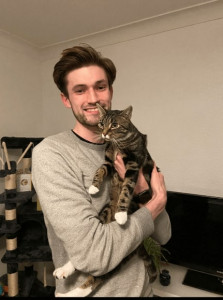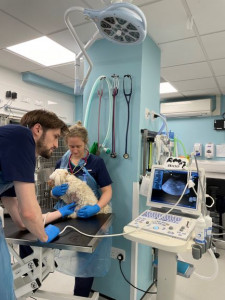James Gilgan, an OOH vet in Manchester Vets Now Referrals Hospital, and previously a Vets Now rotating intern and Emergency Critical Care discipline-specific intern, speaks on his internship experience.
 What did you do before you started your rotating internship?
What did you do before you started your rotating internship?
I initially studied for my veterinary degree at the Royal Veterinary College in London after completing their Veterinary Gateway course which is a preparatory year to support students who don’t meet the traditional entry requirements for vet school. I graduated in 2020 and spent one year working in general practice through a corporate new-graduate scheme. My role was to move around local London based clinics wherever I was needed. Obviously, this was during the COVID19 pandemic, so things were quite different back then. We weren’t doing any face-to-face consults during this whole time. I then started my rotating internship at Vets Now Manchester in July 2021.
What made you apply for an internship? And how did this differ from the new-graduate scheme?
I had always wanted to do a rotating Internship early on in my career. I feel the first few years of clinical practice are the most important for building a solid foundation of skills and becoming confident in being a vet. I was concerned I was going to fall into bad habits and not do things the ideal way without even realising and so I wanted the support and training that an internship provides. I was given sole charge for cases early on and I realised I wanted more supervision and help to manage them appropriately given that I had only recently qualified.
For me, the salary offered by the Vets Now internship was very similar to the new-graduate schemes on offer, so this wasn’t a factor I had to consider. The support between the two programs is very different; in my old job at small branch clinics, I had one or two colleagues available for advice but during my internships in a big hospital I had the whole team, not just my seniors but very experienced vets and nurses 24 hours a day. I loved that during this internship I still got to have primary case responsibility on some rotations but with full back-up whenever I needed it.
So, you had some experience as a vet before you applied…. do you think the Vets Now internships are suitable for new graduates?
Yes, some of my intern mates were newly graduated and have loved their time here. A couple of them have stayed on as OOH vets with me. So, I definitely think the internship is suitable and supports you well. For me I think I liked having done a year in general practice first because it gave me more confidence and familiarity with common medications, doses, and basic physical examination skills, but I don’t think it’s essential for everybody. The caseload here is often more advanced than GP so client communication can be more involved and more daunting if you’ve never consulted as a vet before. But I know where possible the sequence of rotations is adjusted to support newer graduates so that they do their OOH rotation block later on, after spending time with internal medicine, surgery and daytime ECC to build their confidence up first.
What was the best thing about the rotating internship?
I think I enjoyed the exposure to ECC cases the most – I may be bias because I had some interest in this specialty, but this really developed this during my rotating internship to the extent that I stayed on as an ECC specific intern! I enjoyed managing the critical patients with the safety net of senior supervision. Pre-internship I would have found them intimidating but now I find them the most rewarding patients to deal with.
I think the internship promoted a methodical way of thinking and approaching every case and really pushed my existing knowledge in a way that was clinically relevant, and this is hopefully something that will stay with me throughout my career now.
I also loved the friendly and supportive culture. I’d moved to a whole new city, so it was very nice to have a welcoming workplace to help me settle in. I think having a cohort of interns was also lovely, there were 7 of us rotating plus 3 discipline specific, and we were all at a similar level in terms of abilities and stages in our careers which meant we instantly had a shared bond and many of us are now close friends. That’s certainly another difference compared to new-graduate schemes.
Lastly, I submitted a case presentation for consideration and was fortunate enough to be accepted to present at Vets Now’s National ECC Conference in 2022. This was incredibly nerve-wracking, but I loved the experience and got a free conference pass and accommodation, so it was all worth it!
And how about the hardest part of the internship?
The workload is greater than in general practice. Not necessarily from a case volume perspective but I definitely found it more mentally taxing. Due to the complexity of some of the referral cases and the high clinical standard in the hospital there is more paperwork and more thinking/processing time needed. I wanted to make the most of the opportunities available therefore I tried to make sure I fully understood the cases I was seeing which meant finding time in and around the working day to study and read up on things. We also had journal club which meant even more reading. All my friends know I struggle most with my time management so maybe it was just an issue for me!
What advice do you have for current final year vet students considering an internship?
Go for it! There is nothing to lose. It’s really useful to gain the experience and see if hospital-based practice, emergency, or referral practice is the right environment for you. You get a much better idea of this from a rotating internship than you ever can from doing EMS. It’s only one year so very manageable, plus there’s 7 weeks holiday which allowed some of my intern mates to go off travelling for a bit. I feel lots of people might worry that they need more experience or aren’t good enough to do an internship yet but honestly you learn so much in such a short space of time and soon start to feel comfortable in the role.
Since many people will be moving to a new place and the role is challenging at times, it’s important to maintain a good friend network across the country and make the effort to go and spend time with them. It’s the best way to decompress.
What does the future hold for you?
I’m currently applying for ECC residencies while working as an OOH vet here at the Manchester hospital. I get to continue seeing lots of great cases and interacting with referral clinicians so I’m happy. I’ll likely start an ECC certificate in the next 6 months unless I’m lucky enough to be offered a residency training position before then.
If you’re interested in applying for a rotating internship, please see the details below on how to apply.
Interested in an Internship?
Get in touch
Contact Ryan Powell in the Talent Team on 07816 202690 or email [email protected] to discuss your options.
